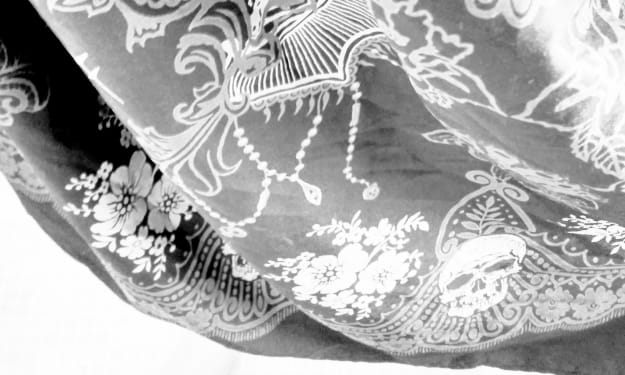The Town That Hungers
Take a trip through a town under a bizarre curse in this vivid pastoral horror tale.

Far from the well-worn paths, but not so far as to be unreachable, lies a little town with a grim burden. Tucked away in the north, nestled in tall hills those of the true north would scoff at if you called them mountains, the inhabitants of this little town live and die and return.
The town is on a lake. The lake shimmers like a mirror, under which swirl the twirling fishes waiting for the spear and the plate. In the summer, you might visit this little town, and see the children playing in the street with cats and dogs, and hear the rambling of the carts on the cobbled roads, and see the men and women out and about in their Sunday best, taking a promenade from the high street to the hillside, and think there's nothing wrong. The children laugh, the strays and beloved pets alike mill about the streets unafraid of people, and the men and women smile at you as you pass. It is such a normal little town in the summer. But if you stay into winter, god help you.
There is only one thing that may warn you of the curse on this place. You may not even notice it at first, but as you move through the streets, see the washer-women, the shop-keeps, the seamstresses, the priests, the children at play, the horses dragging the carts... all lean. Rich and poor, young and old alike bear not an ounce of fat. The ignorant who mismeasure health by girth might take this town as a healthy or even fortunate one, and the kind-hearted might take it as a measure of a difficult year, a spoiled harvest or low fish stock. Both are so very wrong.
As summer turns to autumn, a change comes to the town. The children are quieter. The animals skulk and hide. The men and women who greet you in the street do so curtly, as if distracted by some oncoming horror. They know, even if you don't.
It comes at the very end of autumn, when the trees have shed their last leaves. Once winter takes hold of this town it grips it tightly and guards it jealously. Its grip is swift. So swift it freezes the lake. Not over a week. Not overnight. Instantaneously. From the depths to the surface, the lake is solid.
This signals the start of winter. In the first week, as is tradition, the priests; the only citizens who are never hungry, and therefore the wisest, declare the five feasting days. The town church bears a cross upon its steeple but no longer celebrates Christmas or the Epiphany. Instead once the lake freezes the town descends and Eats. Gloriously, and with abandon. For in those first five days hunting is easy; one simply kills the creatures that were unfortunate enough to be drinking from the lake when the change came. The first feast day is an uproar of bellowing and screaming as harts and hinds, boars and sows, and the woodland creatures are slain where they stand; affixed by their muzzles to the ice. Of course, not all of those caught in the freeze remained, some pulled themselves free, but at a price. It is always best to dig out the torn tongues too; they make such a delicious treat for the children.
The water of the lake is frozen solid, but after the feast days its surface is slick-red. So it shall remain until the spring.
After the euphoria of the feasts the pain-days begin. Now the town is frozen, but not frozen solid. There is no snow. There is no rain. Only icy shards which fracture from the clouds and strike the ground, or anything unfortunate enough to be under them. If they hit a stray, the townsfolk eat. If they hit a person, the strays eat. There is no warmth. The fires that burn do so feebly in hearths that feel drenched in ice-water and choked with mildew. There is no food. The fish are frozen solid, the beasts all hunted or fled, the crops killed. If they are lucky, the townsfolk eat what they salted or pickled from the feast day hunts. If they are unlucky, they eat what they didn't salt or pickle from the feast day hunts. It's not rotten, not really, not in this cold. But to chew the hard blackened hunks of flesh is to warm them in your mouth and taste the decay. It's vile, but you must. Be sure to crack the bones too, to give the babes something to suck.
There is only cold and hunger, and death and hereafter. The cold pinches the lean townsfolk in further, and the hunger makes them cruel, so say the wise, unhungry priests. With gnawing pangs giving them fresh energy they fight their neighbours for gristle or juicy marrowful bones. Neighbour fights with neighbour, and people fight with beasts. The ragged animals, beloved pets and strays and workhorses and cattle alike; grow bent and sharper than they should. The cows feast on their fallen, the strays steal what they can, the workhorses feast on their owner, who could no longer fight the cold.
Oh well, oh well, pull the beasts off him, wrap up what remains and put him on the wagon. The elderly mule who pulls the corpse cart doesn't appear to have an owner, but she tows it back and forth across town every day in winter. Her breath comes in short, stagnant bursts, and her ribs poke through her sides, but when there's a death rest assured she'll trundle up, and stand there, waiting to take her grim load to the church. In winter, nobody travels in the cart alone. Today it's Humphrey, the farmer whose horses ate him as he fell ploughing the barren, frozen earth. And Marie, the seamstress who fell in love with a man whose hunger outweighed his heart. And little Annabelle, struck by an ice shard out running errands for her mother. Her black cat guarded her body with her life until the corpse wagon came, and she paid for it so bravely and so dearly that the family wrapped her up her little body to rest with Annabelle forever. The town gossips thought this a hollow gesture; of course they could afford to waste food with two fewer mouths to feed.
Come on, come up, put on your Sunday best and attend today's funerals. Three in one day, at one time, the priests in their satiated wisdom spouting interchangeable pleasantries whilst the grief-stricken fight to cling on to their happier memories through the biting cold. Then the bodies are wrapped wheeled out of sight to be cremated.
But the fires are so weak, and the priests are never hungry.
Another day comes and goes, and now a winter night falls and the deepest pain begins.
They come out of the steaming red lake. Familiar frost-bitten faces, and four anew. Humphrey, Marie, little Annabelle and her cat.
They are not ghosts, for their flesh is very real. They do not turn into wolves or bats, and they do not crave flesh, though their teeth are so very sharp, jutting out of their slack mouths like a tangle of frost-covered pine needles. Their eyes are white lights in their heads and they can not, do not, speak. They walk into town, every winter's night, and stand where they fit. Humphrey trots by his horses, who nuzzle him affectionately, their hunger forgotten. Marie's sister welcomes her home, and she sits by her nephews' bedside as if to read them a story. Little Annabelle and her cat gambol and play in their garden as her parents watch on, trying to muster fondness for the time-frozen creature that was once their little girl. The dead live as they did in life, with one exception. At all times, their luminous, unblinking eyes are turned towards the church.
The priests, wise in their unhunger, say it is for their salvation. The dead do not speak, only multiply, night by dreadful night.
About the Creator
Chaotic Morphotic
A queer mixed-race nonbinary author of surreal horror & dark sci-fi. From grisly morality tales to vengeful pastoral horror, comedic fantasy & celebrations of survival in the most unlikely places, their work will shock, horrify & delight.






Comments
There are no comments for this story
Be the first to respond and start the conversation.